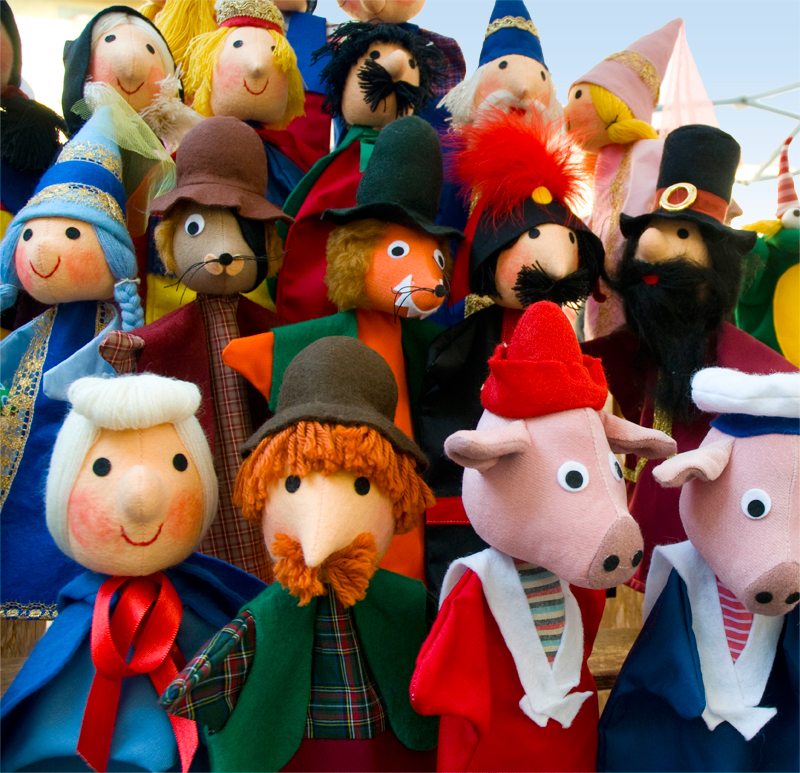< Introducing The South and the Islands
Shopping

Market stall selling children’s toys and puppets
Traditionally, textiles, leather, ceramics and glassware are strong in Italy, and many manufacturing businesses are family-run. Apart from street markets it is not a country for bargains, but window-shopping will offer plenty of family fun. Naples is good for both designer boutiques and small specialist shops and artisan workshops – good places to look for authentic and hand-made souvenirs.
What to buy
It is worth checking out local specialities: Naples is renowned for its Christmas market selling crib characters and Sicily for ceramics and pottery. Sicily has great puppets too, and marzipan.
Rural areas often sell good basketware and local terracotta or ceramic items, as well as a feast of locally produced olive oils, cheeses, truffles, hams, capers and salamis.
For clothes – both children’s and adults’ – you could blow any budget, but bargains can be found at designer factory outlet shops. Top-brand furniture and homeware is often designed and even made in Italy, but that does not make it cheaper than buying at home.
Staff can be snooty in smart shops, so make sure kids are on best behaviour and keep sticky fingers off high-priced merchandise.
Markets and stalls
Most villages and towns across the region have at least one weekly street market, which can be a great place for kids to practise a few words of Italian and perhaps buy a small keepsake to take home. The fruit and vegetable stalls are usually bursting with colourful local produce (fresher and less expensive than in shops) – it is easy to spot the best stalls as there will be a queue of local people. Other stalls may sell basketwork, ceramics, plastic toys, sweets of every shape and hue, as well as cheap household goods, clothes and shoes.
Some larger towns have equally colourful permanent markets. The Vucciria in Palermo, Sicily is a bigger, noisier version of its weekly street markets, where it is usually possible to pick up a good, cheap lunch while browsing the stalls.
Many villages, particularly in tourist areas, have monthly antiques or bric-a-brac markets (tourist offices will have details), although true antiques are hard to find. In December, Christmas markets spring up in town centres selling gifts and items to make nativity scenes. They continue until 6 January when the Befana, a kindly witch, brings sweets for good children and coal for naughty ones. The stalls are full of sugar imitation coal and other sweet treats.
Roadside stalls selling anything from watermelons or mozzarella to baskets and flowerpots are common. Prices are usually good, but check the goods before buying them as there will be no redress.
Food shops and supermarkets
National and international supermarkets such as Esselunga, Coop, Conad, Carrefour and Billa provide good-quality produce. They often have extended opening hours, with larger branches closing at 10pm, and may open on Sundays. There is a wide choice of goods and kids will enjoy spotting the differences from supermarkets at home. For a more authentic experience, pop into an alimentari or delicatessen. The variously shaped pastas, fresh cheeses, hams and salamis are irresistible.
www.billa.it
www.carrefouritalia.it
www.conad.it
www.e-coop.it
www.esselunga.it
Department and chain stores
There are several department store chains – la Rinascente, Coin and Upim – with branches in cities across the region. Upim offers a wide variety of goods at reasonable prices.
Prenatal, which has about 200 branches throughout Italy, is a useful chain of shops specializing in merchandise for younger children, including clothes for under-11s and toys. It also has changing facilities.
www.coin.it
www.prenatal.it
www.rinascente.it
www.upim.it
Sales and factory outlets
Sales (saldi) are held in early January and July on state-appointed dates. Outside these periods, keep an eye out for factory outlets (there are more than 700 of them across Italy), often on the outskirts of towns. Italy’s industry is traditionally based on small, family-run manufacturing concerns, many of which have opened shops to sell off seconds or old stock. Ask at tourist offices or check the internet for particular brands.
www.mcarthurglen.it
Cards and tax refunds
Although debit and credit cards are accepted in larger stores, they are not always welcome in small shops. Visitors resident outside the EU are entitled to a rebate on sales tax (IVA) paid on items over €155. Ask for a receipt at the time of purchase and allow goods to be checked at the airport and the receipt stamped when you depart (see
Useful Information).

